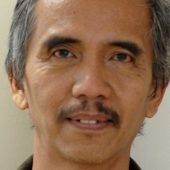The Oxford Internet Institute (University of Oxford) is pleased to announce that Roberto Verzola and Osaro Odemwingie have been selected as the first two civil society practitioners from the Global South to spend time as Academic Visitors at the OII in 2008.
Osaro Odemwingie has been a full-time human rights and development worker since 1997. As Coordinator of the Freedom of Information Coalition in Nigeria, he initiated and coordinated civil society lobbying of Legislative and Executive officers of government to pass a Freedom of Information Act. He is an author, television host, media strategist, trainer, development communicator, campaigner, lobbyist and social researcher.
At the OII he will undertake research on the impact of ICTs on advocacy for transparency and accountability in governance. He said: “I am extremely optimistic that at the end of my six weeks stay at the OII, I will be better equipped on better and more innovative ways that civil society organisations can apply the Internet to improve governance.”
Roberto Verzola is a distinguished activist from the Philippines. His detailed analysis of the 2004 Philippine presidential elections and the 2007 senatorial elections called attention to the chronic cheating that afflicted Philippine elections. At the OII, he will undertake research on technologies for ensuring clean and honest elections, with a specific focus on the 2010 Philippine elections.
He said: “I am eagerly looking forward to tapping the vast academic resources of the Oxford University community to help me learn more about election modernization.’ He continues: ‘I also intend to learn how to conduct election audits, particularly of elections that have been automated. Since the Philippines will be automating its 2010 presidential elections, I would furthermore like to know the latest pros and cons about various election technologies.”
OII Director, Professor William Dutton said: “Both visitors have long experience of undertaking impressive advocacy work and having them come to work at the OII should be a mutually informative and rewarding experience. The Ford Foundation has a significant track record of supporting innovative media projects: we are grateful for their support in establishing the first civil society residence programme aimed at the emerging field of Internet studies.”
[ENDS]
Notes for Editors
The Civil Society Practitioners Programme provides Civil Society Practitioners from the Global South with the resources to pursue research on the social impact of the Internet and related ICTs as Academic Visitors at the Oxford Internet Institute, University of Oxford. It has been made possible by seed funding from the media policy portfolio in the Knowledge, Creativity and Freedom Program of the Ford Foundation.
The Ford Foundation is a resource for innovative people and institutions worldwide. It aims to strengthen democratic values, reduce poverty and injustice, promote international cooperation and advance human achievement.

